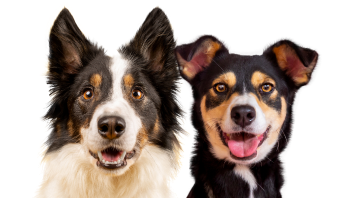DogFoodAdvisor is reader supported See how
All reviews are 100% impartial but if you buy using links on this page, we may earn a referral fee.
Beaverdam Dog Food receives the Advisor’s second highest-tier rating of 4.5 stars.
The Beaverdam product line includes 4 dry dog foods.
Each recipe below includes its related AAFCO nutrient profile when available on the product’s official webpage: Growth, Maintenance, All Life Stages, Supplemental or Unspecified.
Important: Because many websites do not reliably specify which Growth or All Life Stages recipes are safe for large breed puppies, we do not include that data in this report. Be sure to check actual packaging for that information.
Use the links below to check prices and package sizes at an online retailer.
- Beaverdam Hi-Protein [A]
- Beaverdam Eli’s Select Grain Free [A]
- Beaverdam Puppy/Adult Hi-Energy (4 stars) [A]
- Beaverdam 21/12 Skipper’s Choice (3 stars) [A]
Beaverdam Hi-Protein was selected to represent the other products in the line for this review.
Beaverdam Hi-Protein
Estimated Dry Matter Nutrient Content
Protein
Fat
CarbsCarbohydrates
Pork meal, millet pearl grain, sorghum, chicken meal, brown rice, peas, chicken fat (preserved with mixed tocopherols), alfalfa, montmorillonite clay, flax, salt, potassium chloride, vitamins (vitamin E supplement), vitamin B12 supplement, vitamin A supplement, niacin supplement, d-calcium pantothenate, thiamine mononitrate (source of vitamin B1), biotin, riboflavin supplement (source of vitamin B2), vitamin D3 supplement, pyridoxine hydrochloride (source of vitamin B6), folic acid, minerals (zinc sulfate, ferrous sulfate, zinc amino acid chelate, iron amino acid chelate, copper sulfate, copper amino acid chelate, manganese sulfate, manganese amino acid chelate, folic acid, cobalt carbonate), dried chicory root, selenium yeast, lecithin, hydrolyzed yeast, Saccharomyces cerevisiae yeast culture, dried Enterococcus faecium fermentation product, dried Lactobacillus acidophilus fermentation product, dried Aspergillus niger fermentation product, dried Aspergillus niger fermentation extract, dried Trichoderma longibrachiatum fermentation extract, dried Bacillus subtilis fermentation extract, Yucca schidigera extract, choline chloride, taurine, glucosamine hydrochloride, chondroitin, mixed tocopherols and citric acid (preservatives), rosemary extract
Fiber (estimated dry matter content) = 4%
Red denotes any controversial items
| Estimated Nutrient Content | |||
|---|---|---|---|
| Method | Protein | Fat | Carbs |
| Guaranteed Analysis | 27% | 12% | NA |
| Dry Matter Basis | 30% | 13% | 49% |
| Calorie Weighted Basis | 27% | 29% | 44% |
Ingredient Analysis
The first ingredient in this dog food is pork meal. Pork meal is considered a meat concentrate and contains nearly 300% more protein than fresh pork. Yet it can also be high in ash — about 25-30%.
However, the ash content of the final product is typically adjusted in the recipe to allow its mineral profile to meet AAFCO guidelines.
The second ingredient is millet, a gluten-free grain harvested from certain seed grasses. Millet is hypoallergenic and naturally rich in B-vitamins and fiber as well as other essential minerals.
The third ingredient is sorghum. Sorghum (milo) is a starchy cereal grain with a nutrient profile similar to corn.
Since it is gluten-free and boasts a smoother blood sugar behavior than other grains, sorghum may be considered an acceptable non-meat ingredient.
The fourth ingredient is chicken meal, another protein-rich meat concentrate.
The fifth ingredient is brown rice, a complex carbohydrate that (once cooked) can be fairly easy to digest. However, aside from its natural energy content, rice is of only modest nutritional value to a dog.
The sixth ingredient includes peas. Peas are a quality source of carbohydrates. And like all legumes, they’re rich in natural fiber.
However, peas contain about 25% protein, a factor that must be considered when judging the meat content of this dog food.
The seventh ingredient is chicken fat. Chicken fat is obtained from rendering chicken, a process similar to making soup in which the fat itself is skimmed from the surface of the liquid.
Chicken fat is high in linoleic acid, an omega-6 fatty acid essential for life. Although it doesn’t sound very appetizing, chicken fat is actually a quality ingredient.
The eighth ingredient is alfalfa, a flowering member of the pea family. Although alfalfa is high in protein (18%) and fiber, it’s uncommon to see it used in a dog food. This hay-family ingredient is more commonly associated with horse feeds.
The ninth ingredient is montmorillonite clay, a naturally occurring compound rich in many trace minerals. Montmorillonite has been approved for use in USDA Organic Certified products.
Reported benefits include the binding of certain mold-based toxins and even controlling diarrhea and irritable bowel syndrome (IBS).
From here, the list goes on to include a number of other items.
But to be realistic, ingredients located this far down the list (other than nutritional supplements) are not likely to affect the overall rating of this product.
With four notable exceptions…
First, flaxseed is one of the best plant sources of healthy omega-3 fatty acids. Provided they’ve first been ground into a meal, flax seeds are also rich in soluble fiber.
However, flaxseed contains about 19% protein, a factor that must be considered when judging the actual meat content of this dog food.
Next, chicory root is rich in inulin, a starch-like compound made up of repeating units of carbohydrates and found in certain roots and tubers.
Not only is inulin a natural source of soluble dietary fiber, it’s also a prebiotic used to promote the growth of healthy bacteria in a dog’s digestive tract.
In addition, this recipe includes selenium yeast. Unlike the more common inorganic form of selenium (sodium selenite), this natural yeast supplement is considered a safer anti-cancer alternative.
And lastly, this food contains chelated minerals, minerals that have been chemically attached to protein. This makes them easier to absorb. Chelated minerals are usually found in better dog foods.
Nutrient Analysis
Judging by its ingredients alone, Beaverdam Dog Food looks like an above-average dry product.
But ingredient quality by itself cannot tell the whole story. We still need to estimate the product’s meat content before determining a final rating.
The dashboard displays a dry matter protein reading of 30%, a fat level of 13% and estimated carbohydrates of about 49%.
As a group, the brand features an average protein content of 30% and a mean fat level of 16%. Together, these figures suggest a carbohydrate content of 46% for the overall product line.
And a fat-to-protein ratio of about 54%.
Near-average protein. Near-average fat. And below-average carbs when compared to a typical dry dog food.
Even when you consider the protein-boosting effect of the peas, alfalfa and flaxseed, this looks like the profile of a kibble still containing a moderate amount of meat.
Bottom line?
Beaverdam includes both grain and grain-free dry dog foods using a moderate amount of named meat meals as its main source of animal protein, thus earning the brand 4.5 stars.
Highly recommended.
Please note certain recipes are sometimes given a higher or lower rating based upon our estimate of their total meat content and (when appropriate) their fat-to-protein ratios.
Beaverdam Dog Food Recall History
The following list (if present) includes all dog food recalls since 2009 directly related to Beaverdam. If there are no recalls listed in this section, we have not yet reported any events.
You can view a complete list of all dog food recalls sorted by date. Or view the same list sorted alphabetically by brand.
Compare This Dog Food
How does this brand compare with The Dog Food Advisor's most recommended brands?
A Final Word
The Dog Food Advisor does not accept money, gifts, samples or other incentives in exchange for special consideration in preparing our reviews.
However, we do receive a referral fee from online retailers (like Chewy or Amazon) and from sellers of perishable pet food when readers click over to their websites from ours. This helps cover the cost of operation of our free blog. Thanks for your support.
For more information, please visit our Disclaimer and Disclosure page.









